Key takeaways:
- Lifelong learning fosters critical thinking, adaptability, and engagement with diverse perspectives, enhancing both personal and professional growth.
- Political commentary encourages deeper understanding and challenges personal biases, facilitating richer dialogue and civic participation.
- Strategies like setting goals, active engagement, and reflection are vital for effective learning and retention of complex topics.
- Creating a consistent yet flexible learning routine can transform understanding and encourage collaborative discussions.
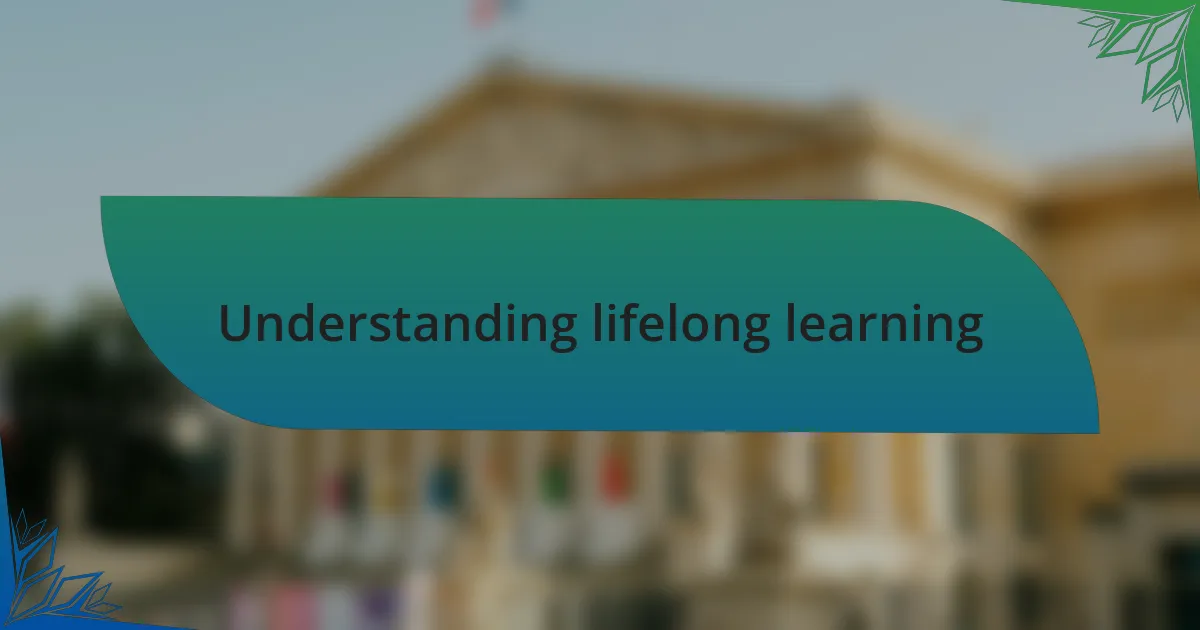
Understanding lifelong learning
Lifelong learning is more than just a buzzword; it’s a mindset. I remember when I first realized this—sitting in a café, a book on political history in hand, and feeling that thrill as I connected past events to current political climates. This moment made me appreciate how learning is an ongoing journey, not just confined to school but deeply woven into our everyday lives.
Have you ever considered how the world around us is constantly changing? I found myself questioning my viewpoints during a heated debate with friends about social justice issues; I realized how essential it was to keep educating myself. Engaging with diverse perspectives has not only broadened my understanding but has also encouraged me to adapt my beliefs as new information surfaces.
Reflecting on my own experiences, I’ve discovered that lifelong learning is crucial in navigating the complexities of politics. Whether it’s through reading articles, participating in discussions, or attending seminars, each encounter enhances my awareness and fosters a commitment to growth. This process is not always easy, but the emotional rewards—like a deeper understanding of the world and a sense of connection with others—make every effort worthwhile.
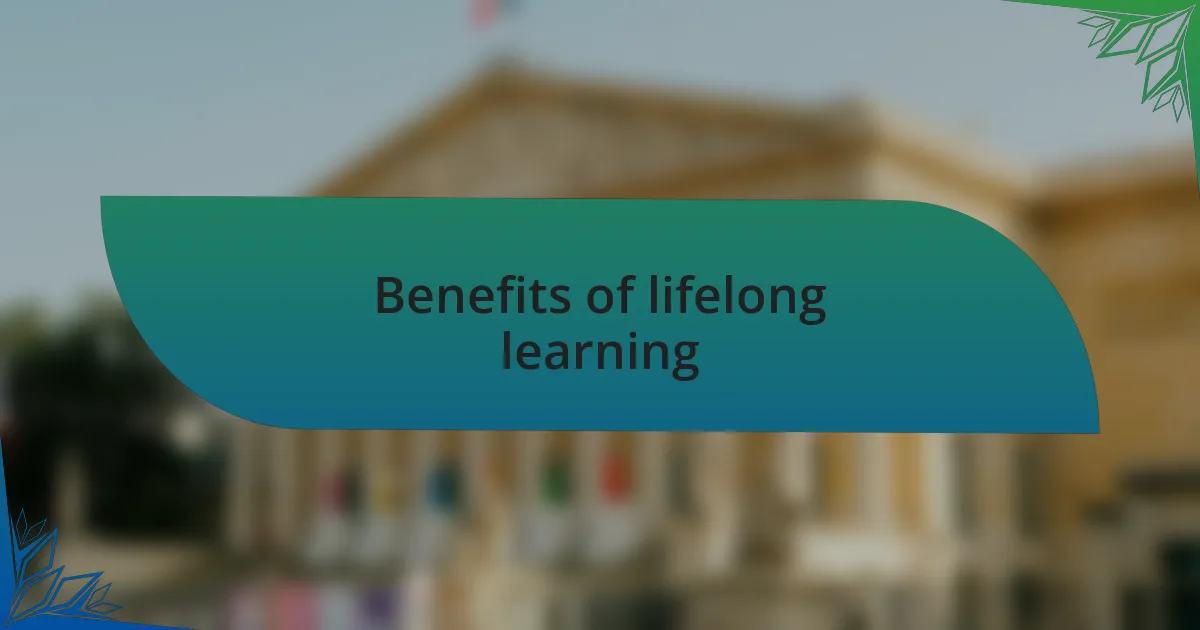
Benefits of lifelong learning
Lifelong learning opens doors to new opportunities, both personally and professionally. I recall a time when I decided to take a class on public speaking, something that intimidated me. The experience not only improved my communication skills but also increased my confidence during political discussions; I became more willing to share my thoughts and engage others in meaningful conversations.
One of the most significant benefits I’ve experienced is the enhanced ability to think critically about issues. I vividly remember a debate about immigration policy where my understanding was put to the test. The research I had done empowered me to articulate my perspective more articulately, proving that knowledge fosters not just confidence but also clarity in complex conversations.
Moreover, lifelong learning nurtures adaptability, which is essential in our rapidly changing world. Recently, I noticed how new developments in technology were reshaping political campaigns. By staying informed, I found myself getting ahead of the curve, integrating these insights into my discussions. Isn’t it remarkable how being a committed learner can transform not just your understanding but your entire approach to engaging with the world?
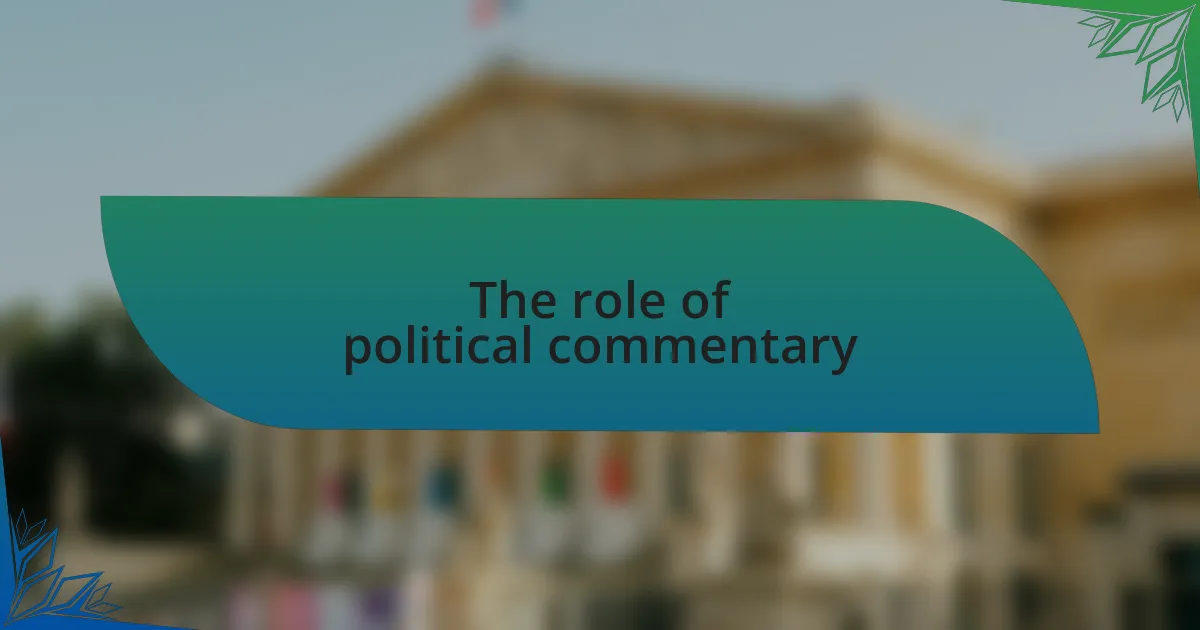
The role of political commentary
Political commentary serves as a crucial lens through which we analyze current events and policies. I remember listening to a seasoned commentator dissect a recent election; their insights helped me see beyond the headlines and understand the implications of various candidates’ platforms. This deeper reflection inspired me to grapple with my own views and the values I hold dear.
Engaging with political commentary not only informs us but also challenges our assumptions. After immersing myself in different perspectives, I found myself questioning my own biases. Have you ever felt that moment of realization where you see an issue from an entirely new vantage point? It’s an exhilarating experience that can lead to personal growth and a richer dialogue with others.
Moreover, thoughtful political commentary can ignite public discourse and encourage civic participation. I recall participating in a community forum sparked by an insightful piece I read. The article prompted me to express my views, which in turn motivated others to engage. Isn’t it fascinating how one well-articulated commentary can galvanize a community into action?
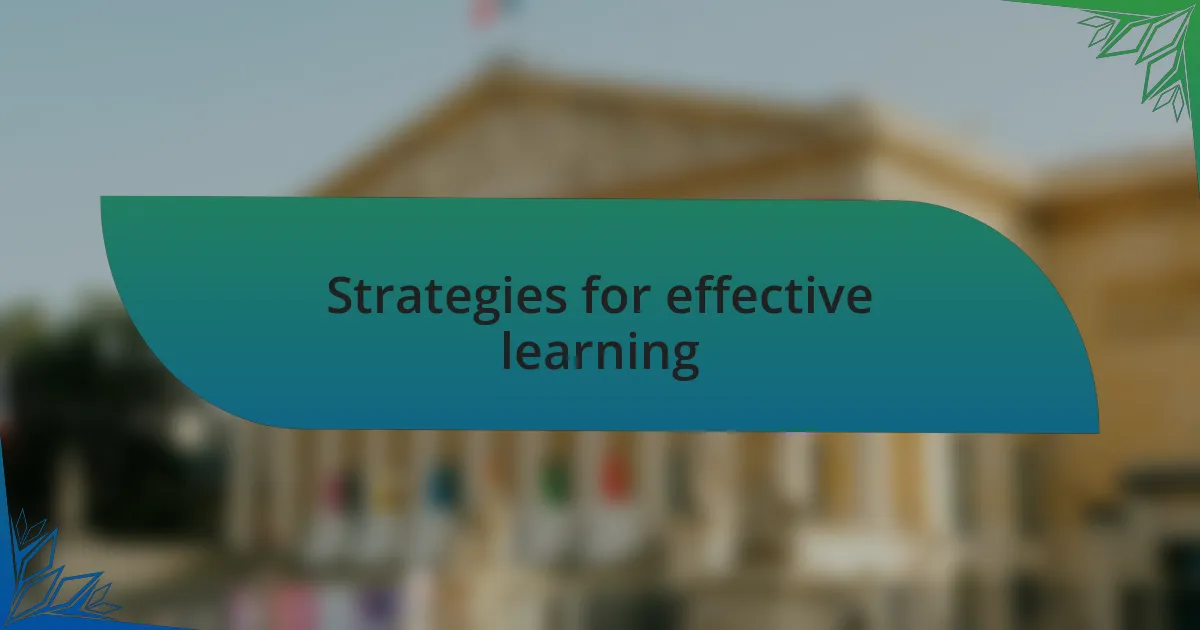
Strategies for effective learning
One effective learning strategy I’ve embraced is setting specific goals. For instance, I remember a time when I aimed to comprehensively understand a complex political theory over a month. By breaking down that theory into weekly topics, I not only kept myself accountable but also enhanced my retention significantly. Have you considered how setting tangible milestones might transform your learning experience?
Another approach that has proven invaluable is active engagement with the material. I often find that simply passively reading does not suffice. Instead, when I joined a discussion group focused on political ideas, it turned my solitary study into lively debates. This interaction deepened my understanding and allowed me to see different angles of the same issue. Have you tried discussing what you’ve learned with others?
Lastly, I’ve discovered that reflection plays a key role in cementing knowledge. After tackling a particularly dense article, I take a moment to jot down my thoughts and reactions. This practice helps me process information and clarify my stance. Have you ever taken time to reflect after learning something new? It can lead to profound insights and a more nuanced understanding of complex topics.
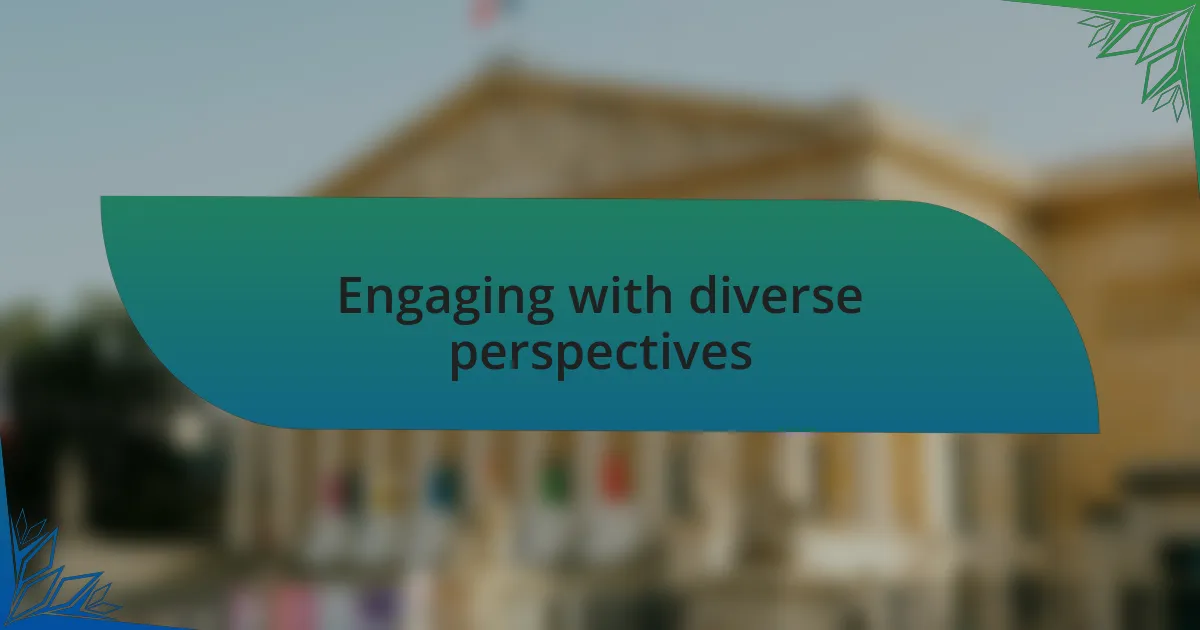
Engaging with diverse perspectives
Engaging with diverse perspectives has been a cornerstone of my learning journey. I remember a particular seminar where a guest speaker shared insights from a completely different political background than mine. Initially, I felt resistant to some of their views, but as I sat and listened, I realized that challenging my own beliefs can lead to growth. Have you ever found yourself shifting your perspective after hearing a well-articulated argument from someone you disagreed with?
One engaging experience I had involved attending a panel discussion where each participant represented distinct ideological standpoints. It was fascinating to witness how their interactions often sparked revelations in my own thinking. Through this exposure, I learned that embracing differing viewpoints doesn’t mean I have to change my beliefs; rather, it enriches my understanding and fosters empathy. Can it be daunting to engage with perspectives that clash with our own?
Living in an echo chamber can be comfortable, but stepping outside of that bubble is essential. I recall a challenging but rewarding conversation with a friend who held views I found difficult to reconcile. It required patience and a willingness to listen without judgment, ultimately leading to a deeper appreciation of the complexity of political discourse. How often do we allow ourselves to engage genuinely with beliefs that initially seem foreign?
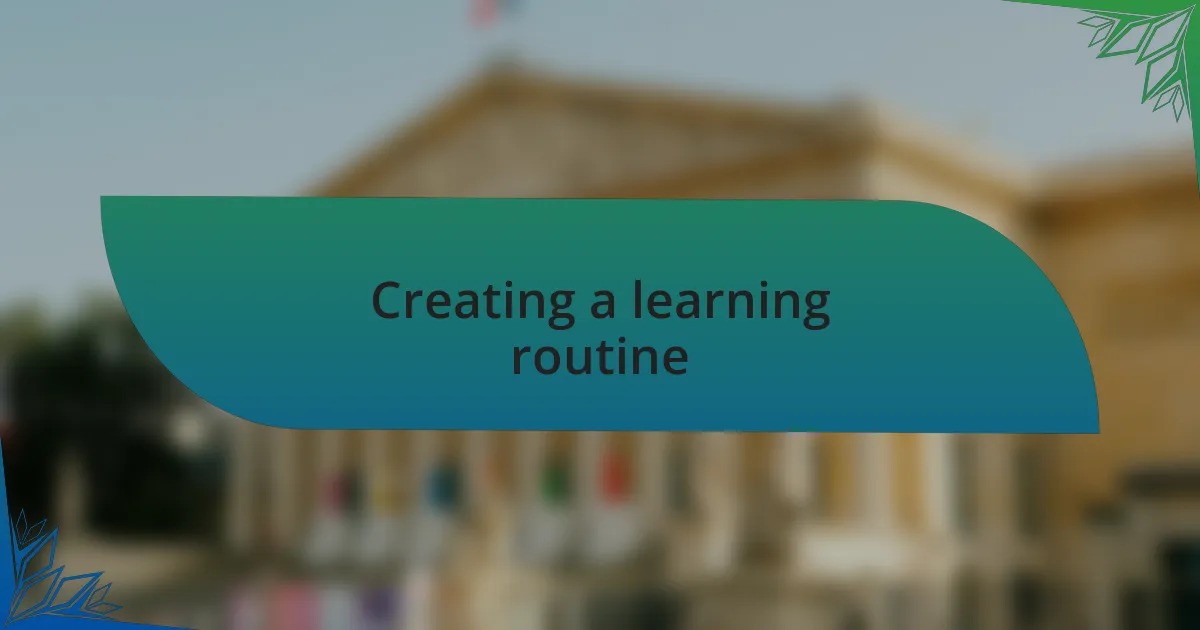
Creating a learning routine
Creating a consistent learning routine has been a game-changer for me. I started by allocating just 30 minutes each morning to read diverse articles or books, which sparked a transformation in my understanding of various political ideologies. Have you ever noticed how starting your day with intentional learning can set a positive tone for everything that follows?
As my routine developed, I began incorporating discussions into my learning process. I would engage weekly with a small group of friends, each with their unique viewpoints. I vividly recall the excitement of hosting lively debates over coffee, where we all brought something different to the table. It wasn’t just about sharing ideas; it was also about creating a community that held one another accountable for growth. Can you think of a time when discussing topics with others propelled your own learning?
Now, I believe that flexibility within one’s routine is crucial. While I cherish my scheduled learning time, I also recognize the importance of spontaneity. For instance, when a thought-provoking podcast episode piqued my interest during a mundane commute, I made it a point to dive deeper into that topic later. How often do we allow unexpected moments to enhance our learning journeys?
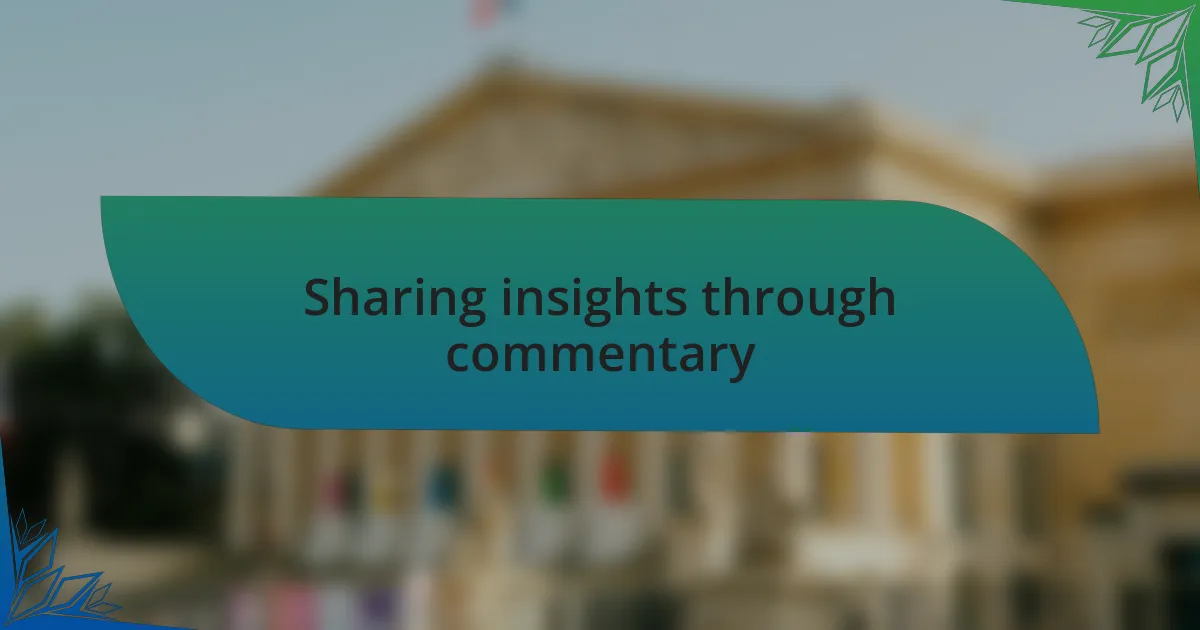
Sharing insights through commentary
Engaging in commentary is a powerful way to share insights. I often find that writing my thoughts down forces me to articulate complex ideas clearly. One memorable experience was when I crafted an article about the impact of social media on political discourse. The feedback I received from readers opened my eyes to perspectives I hadn’t considered before. Isn’t it fascinating how commentary can ignite conversations and broaden our understanding?
I remember attending a political seminar where various commentators shared their insights. Each presenter had a distinct style, ranging from analytical to passionate storytelling, which made me realize that there’s no one right way to convey messages. I started incorporating different styles into my own work. Have you ever thought about how varying your approach can connect you with a wider audience?
Through commentary, I’ve learned to appreciate the significance of vulnerability. When I openly shared my concerns about a particular policy, I was surprised by the support that followed. Many readers echoed my sentiments, emphasizing the collective struggle we face. It’s moments like these that remind me: sharing insights can create a strong sense of community, where diverse voices harmonize to shape a richer dialogue.